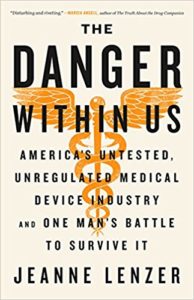 The European Medicines Agency (EMA) has finalized its reflection paper on the frailty of senior clinical trial participants after receiving feedback from the U.S. FDA. The purpose of the document is to encourage sponsors to assess the baseline frailty characteristics of trial subjects; notably, a frailty assessment could take 10-15 minutes and add to the burden on subjects and sites. (Regulatory Focus)
The European Medicines Agency (EMA) has finalized its reflection paper on the frailty of senior clinical trial participants after receiving feedback from the U.S. FDA. The purpose of the document is to encourage sponsors to assess the baseline frailty characteristics of trial subjects; notably, a frailty assessment could take 10-15 minutes and add to the burden on subjects and sites. (Regulatory Focus)
Acceptance of Clinical Data to Support Medical Device Applications and Submissions. Frequently Asked Questions
 On February 21, 2018, FDA amended its regulations on the acceptance of data from clinical investigations for medical devices. Under the new rule, FDA requires that data submitted from clinical investigations conducted outside of the U.S. (OUS) intended to support an IDE or application or submission for a device be from investigations conducted in accordance with good clinical practice (GCP). This guidance document is intended to help sponsors and applicants understand and comply with these new requirements (FDA.gov)
On February 21, 2018, FDA amended its regulations on the acceptance of data from clinical investigations for medical devices. Under the new rule, FDA requires that data submitted from clinical investigations conducted outside of the U.S. (OUS) intended to support an IDE or application or submission for a device be from investigations conducted in accordance with good clinical practice (GCP). This guidance document is intended to help sponsors and applicants understand and comply with these new requirements (FDA.gov)
Should we be using real-world evidence (RWE) for marketing decisions?
![]() In an editorial in the New England Journal of Medicine, two medical device experts posit that real-world evidence (RWE) is most useful in the postmarket setting, where our current systems are inadequate for ensuring the safety and performance of medical devices. However, using RWE for initial marketing decisions for medical devices carries significant risk, as RWE analyses are observational in nature and don’t control for treatment selection bias. (Regulatory Focus)
In an editorial in the New England Journal of Medicine, two medical device experts posit that real-world evidence (RWE) is most useful in the postmarket setting, where our current systems are inadequate for ensuring the safety and performance of medical devices. However, using RWE for initial marketing decisions for medical devices carries significant risk, as RWE analyses are observational in nature and don’t control for treatment selection bias. (Regulatory Focus)
Some practical advice for clinicians to avoid regulatory scrutiny
 The Anti-Kickback Statute (1972) which prohibits clinicians and researchers from offering or accepting any payment to induce federal healthcare business, is an important legal rule pertinent to clinical studies. When agreeing to participate in clinical trials, clinicians should be mindful of the risks and possible legal scrutiny under the Anti-Kickback Statute, and follow the guidance of the Pharmaceutical Research and Manufacturers of America to minimize their risk. (Clinical Leader)
The Anti-Kickback Statute (1972) which prohibits clinicians and researchers from offering or accepting any payment to induce federal healthcare business, is an important legal rule pertinent to clinical studies. When agreeing to participate in clinical trials, clinicians should be mindful of the risks and possible legal scrutiny under the Anti-Kickback Statute, and follow the guidance of the Pharmaceutical Research and Manufacturers of America to minimize their risk. (Clinical Leader)
NIH Single IRB Policy effective now!
The effective date of the NIH Single IRB Policy is January 25, 2018, and the NIH is taking measures to help organizations make internal changes to facilitate single IRB review. The NIH has provided CTSA (Clinical and Translational Science Awards) Program awardees with funds to develop resources for the research community to be successful in implementing this policy. (National Institutes of Health)
Compliance date for Common Rule Revisions delayed to July 19, 2018
 Federal agencies have issued an interim final rule(“IFR”) that delays until July 19, 2018 compliance with changes to the Federal Policy for the Protection of Human Subjects (the “Common Rule”) that were to become effective on January 19. However, the delay did not affect the NIH Single IRB Policy, and all domestic sites participating in NIH funded multi-site studies must use a single Institutional Review Board effective January 25, 2018. (K&L GATES)
Federal agencies have issued an interim final rule(“IFR”) that delays until July 19, 2018 compliance with changes to the Federal Policy for the Protection of Human Subjects (the “Common Rule”) that were to become effective on January 19. However, the delay did not affect the NIH Single IRB Policy, and all domestic sites participating in NIH funded multi-site studies must use a single Institutional Review Board effective January 25, 2018. (K&L GATES)
New NIH policy classifies behavioral science research as clinical trials

Freud, Jung, and other behavioral scientists
On January 25, 2018, the National Institutes of Health (NIH) adopted new rules that will re-classify many federally funded human behavior studies that were considered basic research as clinical trials. This policy change poses new requirements for behavioral scientists and has provoked a backlash from them. (Science)
“The future of weed science is a van in Colorado”
Recreational marijuana use is legal in Colorado, but federal laws restrict research – Federal law prohibits scientists from experimenting with anything but government-grown pot, which is different than the weed people actually use, and researchers are not allowed to bring commercial cannabis products into their lab and directly test their effects. The University of Colorado Boulder has built a research lab in a traveling Dodge “CannaVan” to study the potential risks and benefits of cannabis use among medical patients, which gets around federal restrictions on cannabis research. (WIRED)
New book. “The Danger Within Us: America’s Untested, Unregulated Medical Device Industry and One Man’s Battle to Survive It”
 Drugs must undergo two clinical trials before being allowed on the market, but the overwhelming majority of medical devices that are on the market that are implanted in patients undergo no clinical trials. The 21st Century Cures Act passed in 2016 allows the level of evidence that’s used to approve medical devices to degrade even further. (wbur.org)
Drugs must undergo two clinical trials before being allowed on the market, but the overwhelming majority of medical devices that are on the market that are implanted in patients undergo no clinical trials. The 21st Century Cures Act passed in 2016 allows the level of evidence that’s used to approve medical devices to degrade even further. (wbur.org)
An Interview with Vicki Seyfert-Margolis, CEO, MyOwnMed™. “Digital Technologies – Enabling a New Model for Clinical Research”
Interview and article by Teresa C. Gallagher, Ph.D., MPH, Editor, Clinical Research Currents On October 6, Vicki Seyfert-Margolis, Ph.D., Founder and CEO, MyOwnMed™ in Washington, DC spoke at the DIGIMED17 conference in San Diego on “Digital Technologies: Enabling a new Model for Clinical Research.” Clinical Research Currents had the opportunity Read more
- « Previous Page
- 1
- 2
- 3
- 4
- …
- 8
- Next Page »
